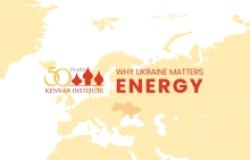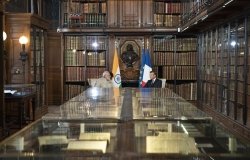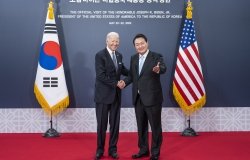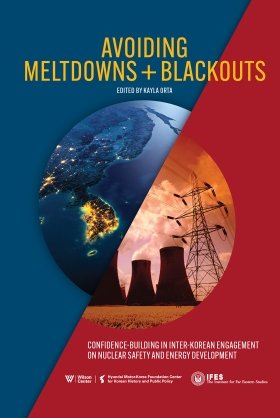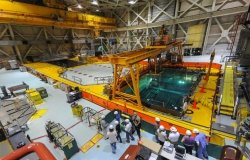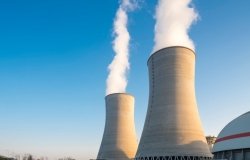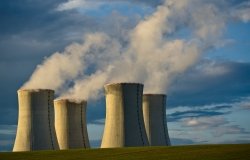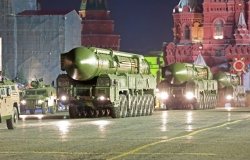Mexico and the Nuclear Summit: Can Peña Nieto Seize the Opportunity?
President Enrique Peña Nieto is in Washington this week to participate in the Nuclear Summit hosted by U.S. President Obama. As part of the North American and Latin American communities, Mexico is ideally positioned to offer an example of good nuclear citizenship.

President Enrique Peña Nieto is in Washington this week to participate in the Nuclear Summit hosted by U.S. President Obama. While most attention has been focused on the participation of other countries in the talks, the explicit request by the United States government for the Mexican President’s presence offers an opportunity to focus on Mexico’s highly positive role in the global nuclear non-proliferation and safeguards regime. Although Mexico is not a major nuclear player, with no nuclear weapons and only one nuclear power plant of note (Laguna Verde, a 1.365 GW capacity plant that produces 4.5% of the nation’s electricity), the country has nonetheless played an important role in the history of non-proliferation and continues to be a showcase for best practices in the nuclear safeguards realm.
Mexico is a signatory to the Nuclear Non-Proliferation Treaty (NPT), ratifying the treaty in 1969 and the Additional Protocol in 2004. It is also party to the 1979 Convention on the Physical Protection of Nuclear Material, ratified in 1988. Most importantly, however, Mexico became a pioneer of the non-proliferation movement through the 1967 hosting and negotiation of the Treaty of Tlatelolco (Treaty for the Prohibition of Nuclear Weapons in Latin America and the Caribbean). This groundbreaking treaty among the nations of the western hemisphere was instrumental in making Latin America a nuclear weapons-free zone. Just as significant as the impact of the treaty in the hemisphere has been its legacy in Mexico’s foreign service, where it is seen as representing the pinnacle of Mexican diplomatic prowess. Mexico serves as the depository for the treaty. Alfonso Garcia Robles, the Mexican diplomat who was the driving force behind the treaty and who later became foreign minister, received the Nobel Peace Prize in 1982 for his achievement.
Mexico has also been a member of the International Atomic Energy Agency (IAEA) since 1958 and, as such, is committed to rejecting the use of nuclear materials and equipment for military purposes. Under the terms of the Tlatelolco Treaty, Mexico has committed to notify the Agency regularly about the country’s nuclear installations, and to maintain a detailed inventory of nuclear materials (in addition to the two reactors at Laguna Verde, there is a small reactor at the Instituto Nacional de Investigaciones Nucleares, located between Mexico City and Toluca).
Since joining the IAEA, Mexico has consistently played a leadership role, participating in the Board of Governors (BOG) on 17 occasions and chairing the BOG between 1983-84.
In an agreement signed between the IAEA and Mexico in 1972, Mexico accepted the application of safeguards to all basic and fissionable materials in Mexican territory. The Mexican agency tasked with carrying out these functions and with cooperating with international inspectors is the Comisión Nacional de Seguridad Nuclear y Salvaguardias (CNSNS or National Commission for Nuclear Security and Safeguards), which was created in 1979 by the Ley Reglamentaria del Artículo 27 Constitucional en Materia Nuclear de 1979, and is now part of the nation’s energy ministry. For many years, Juan Eibenschutz, an internationally recognized and respected nuclear energy expert, has directed the commission.
However, despite the long tradition of Mexican “good citizenship” in the issue of non-proliferation, there has recently been a concern that successive recent governments have neglected the issue, and that Mexico has ceased to exercise a leadership role. Indeed, in recent times there have also been reports of Mexico failing to make its reports in time to the IAEA, suggesting that the issue is no longer viewed as a priority for the government.
The Washington nuclear summit, and President Peña’s participation therein, offer a chance for Mexico to reaffirm its commitment to the international regime and to exercise a leadership role once again in Latin America, and more broadly among developing countries. Given growing concern about climate change, and the need to develop plans to meet a sub-2 degree rise in global temperatures, nuclear energy will have to play a role in satisfying future growth in electricity demand. With a growing middle class that has rising aspirations, and a proud tradition of peaceful nuclear activity, Mexico can offer an example to other nations who are facing similar challenges. More importantly, Mexico should offer to provide international technical assistance on nuclear monitoring, reporting and inventories, and would be seen by many as a neutral arbiter of disputes over nuclear programs. Such an international role would of course necessitate a redoubling of efforts at the national level, with greater investment in the CNSNS and improved communication with the IAEA and other international actors, and this is much more feasible now that that the Mexican energy reform process is progressing well. Collaboration between SENER and the U.S. Department of Energy on nuclear issues should become an integral part of the bilateral agenda, and should also feature in trilateral talks with Canada.
Today’s nuclear summit in DC should therefore be seen as an opportunity to recapture the spirit of Tlatelolco and to propel Mexican leadership in this issue area once again. As part of the North American and Latin American communities, Mexico is ideally positioned to offer an example of good nuclear citizenship.
*Duncan Wood is the Director of the Mexico Institute at the Wilson Center. Cristina Contreras is a Graduate Student at the Fletcher School of Law and Diplomacy at Tufts University.
About the Authors

Mexico Institute
The Mexico Institute seeks to improve understanding, communication, and cooperation between Mexico and the United States by promoting original research, encouraging public discussion, and proposing policy options for enhancing the bilateral relationship. A binational Advisory Board, chaired by Luis Téllez and Earl Anthony Wayne, oversees the work of the Mexico Institute. Read more

